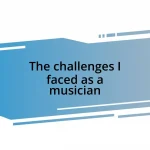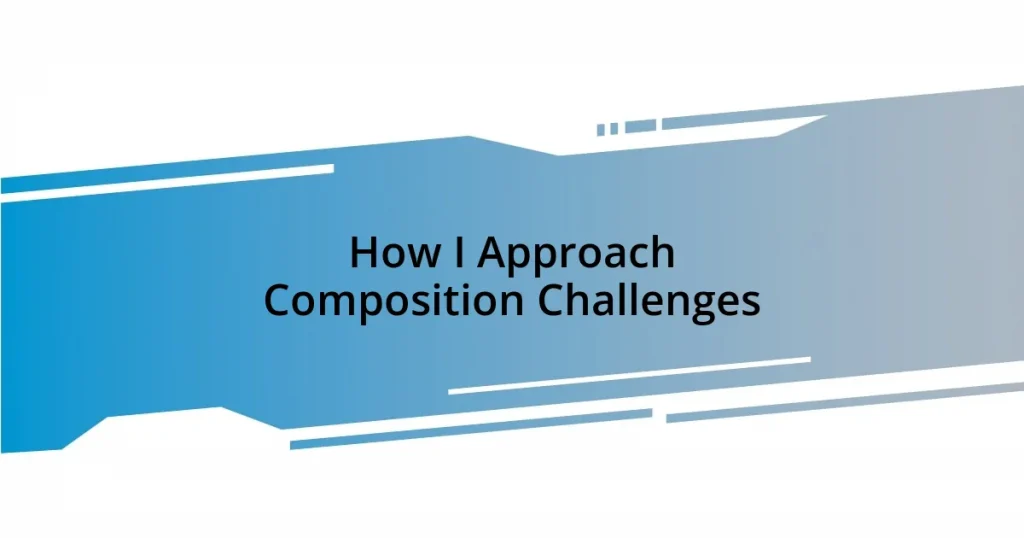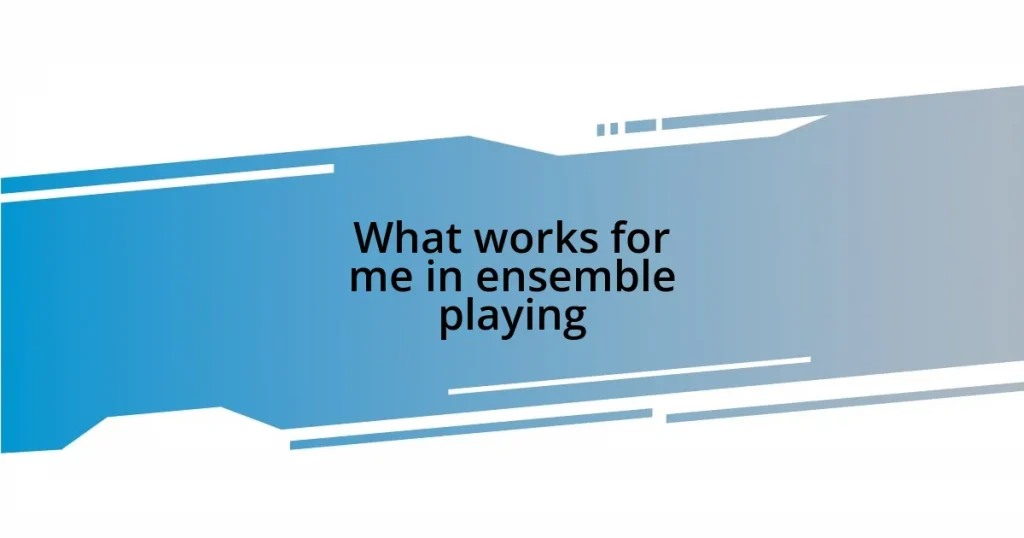Key takeaways:
- Understanding composition challenges involves recognizing emotional barriers and reframing them as growth opportunities.
- Identifying personal strengths, such as storytelling, can transform writing obstacles into opportunities for creative expression.
- Utilizing techniques like creating a dedicated writing space, breaking tasks into smaller chunks, and setting deadlines can enhance productivity.
- Embracing feedback, asking specific questions, and exploring different composition styles contribute to continuous growth and improvement in writing.
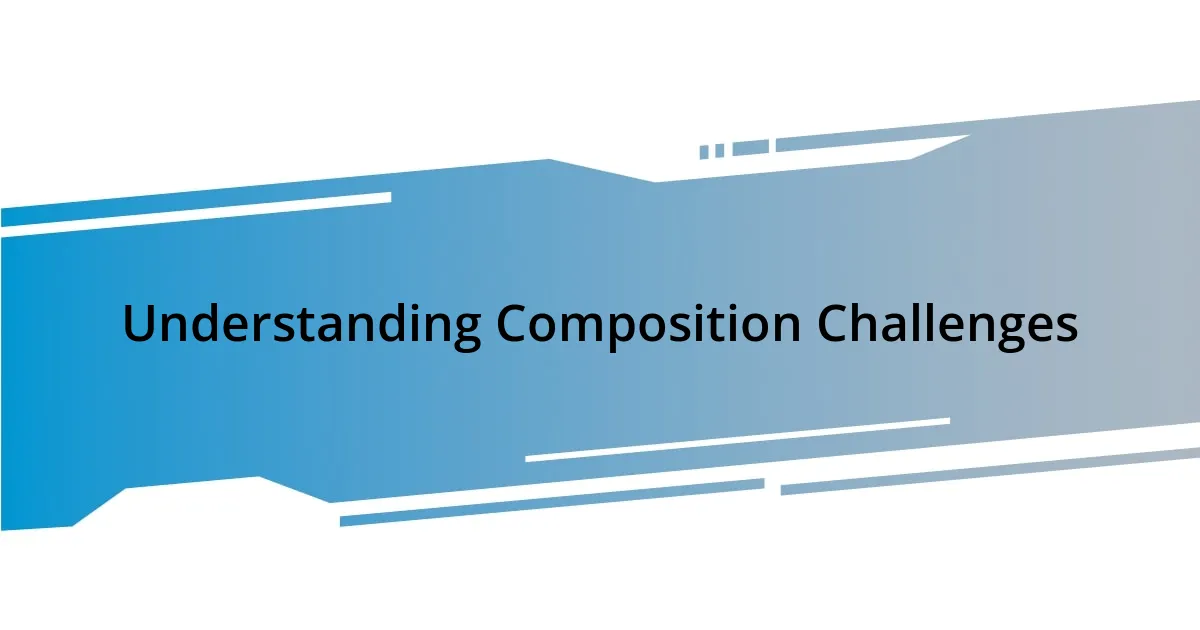
Understanding Composition Challenges
Composition challenges can often feel overwhelming, even to seasoned writers. I remember a time when I was faced with a blank page, the pressure weighing on me like a heavy blanket. Have you ever stared at your screen, unsure of where to begin? It can be daunting, but recognizing the source of those obstacles helps in overcoming them.
For me, understanding the different surfaces of composition challenges goes beyond mere technique; it taps into emotional experiences. Sometimes, I find fear of judgment lurking in the shadows, stifling my creativity. When I embrace that fear instead, inviting it into the writing process, I often discover a depth of vulnerability that makes my work more authentic.
It’s fascinating how even simple elements—like structure, purpose, and audience—can become hurdles if we’re not fully aware of them. Reflecting on my journey, I’ve learned that addressing composition challenges often requires a shift in perspective, viewing them not as blocks but as opportunities for growth. How do you view your challenges? Isn’t it amazing how reframing our thoughts can spark new ideas?

Identifying Your Strengths
Identifying my strengths has been vital in navigating the sometimes tumultuous waters of writing. I remember a time when I felt lost in a sea of words, unsure of how to convey my ideas effectively. It was during a workshop that I realized my knack for storytelling was one of my greatest assets. I began to focus on that strength, and suddenly, what once felt like an insurmountable challenge transformed into an exciting opportunity to share my narrative.
To help you identify your strengths, consider the following:
- Reflect on past successes: What projects made you feel the most accomplished?
- Seek feedback: Ask friends or colleagues which qualities they admire in your writing.
- Experiment with different styles: Maybe poetry resonates more than prose, or vice versa.
- Notice patterns: What topics do you find yourself drawn to repeatedly?
- Journaling: Regularly jot down your thoughts and feelings about your writing process.
By engaging in these practices, you’ll begin to uncover the unique strengths that can empower your composition journey. Embracing what you’re naturally good at can provide a solid foundation when facing challenges, allowing you to lean into your talents rather than feeling overwhelmed.
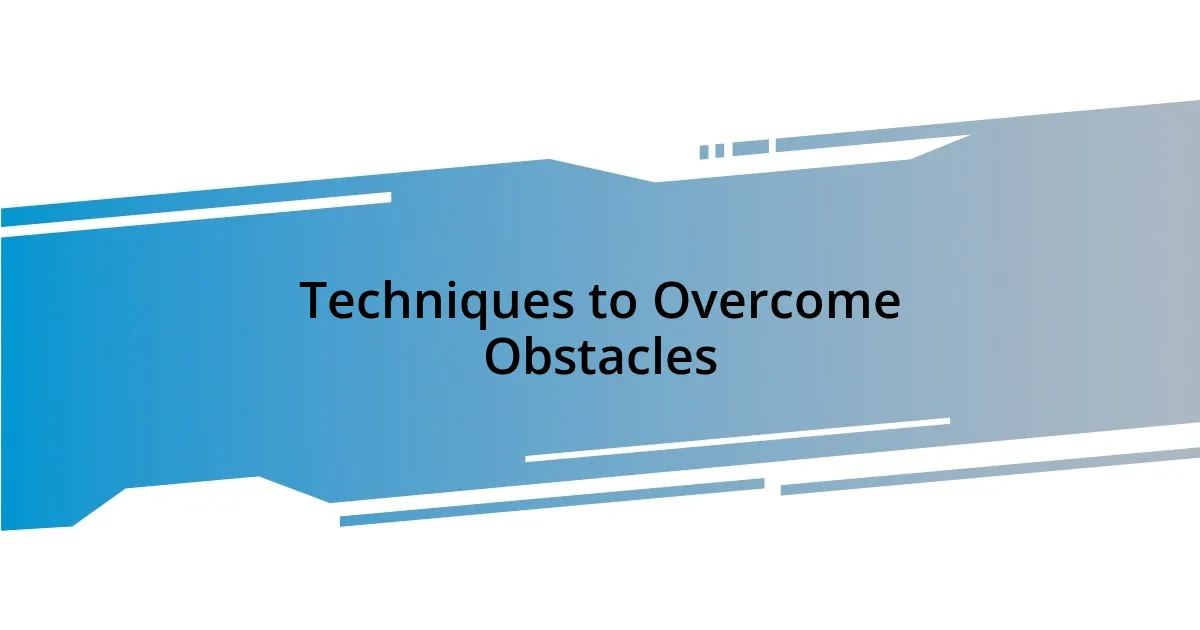
Techniques to Overcome Obstacles
Overcoming obstacles in writing often requires a toolbox of techniques tailored to your needs. One effective method is creating a dedicated writing space. I had a moment when I transformed a corner of my living room into a mini writing sanctuary, complete with inspiring quotes and cozy lighting. This physical shift not only spurred creativity but also minimized distractions, allowing my thoughts to flow unhindered. Have you ever tried changing your environment? Trust me, it can be a game-changer.
Another technique that has consistently worked for me is breaking tasks into smaller, manageable chunks. When I faced a challenging essay, I decided to tackle it one section at a time instead of being overwhelmed by the entire project. By focusing on one paragraph, one idea at a time, I felt an incredible sense of achievement with each small completion. In your own writing, how might you apply this approach? It’s about transforming the daunting into the doable.
Finally, setting specific deadlines can create a sense of urgency that fosters productivity. I remember a writing challenge I joined, where I committed to 500 words a day. The imposed structure helped me develop a routine, turning writing from a chore into a fun challenge. Could a timer in your writing practice help bolster your creative instincts? I encourage you to explore how deadlines could enhance your writing efficiency.
| Technique | Description |
|---|---|
| Dedicated Writing Space | Transforming your environment can enhance creativity and minimize distractions. |
| Chunking Tasks | Breaking down writing projects into smaller sections makes them more manageable. |
| Setting Deadlines | Creating specific deadlines fosters a sense of urgency and helps develop a consistent routine. |

Evaluating Different Composition Styles
Evaluating different composition styles has been a pivotal part of my writing journey. I remember experimenting with various forms, from structured essays to free-verse poetry, and each one revealed different aspects of my creativity. Do you ever find that the style you choose can change the way you express your ideas? I’ve certainly noticed that a more rigid format can sometimes stifle my voice, while a free form allows for more spontaneous expression.
One composition style I’ve found effective is the narrative approach. It creates a connection with readers, inviting them to immerse themselves in the story. I once wrote a personal essay using this style, weaving my experiences into a narrative arc that highlighted my growth. Engaging the audience through storytelling felt not just liberating but incredibly powerful. Have you tried sharing your own experiences in this way? It might just captivate your readers more than you think.
On the other hand, I’ve also had success with analytical writing. This style demands a certain level of structure and critical thinking that pushes my intellect. During my studies, writing essays with clear arguments and evidence helped me clarify my thoughts, leading to a deep understanding of the subject matter. Are you familiar with the satisfaction that comes from dissecting a complex topic? Each composition style brings its unique flavor, allowing us to explore different facets of our voice and skill, and I encourage you to discover which styles resonate with you the most.
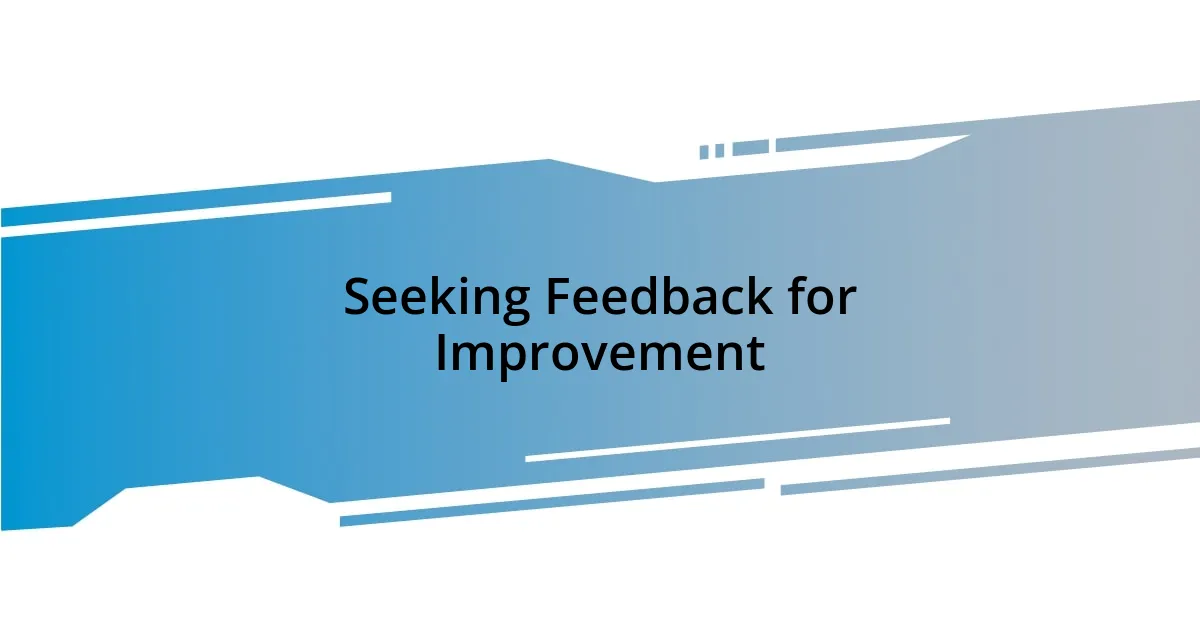
Seeking Feedback for Improvement
Seeking feedback can feel daunting, but I’ve come to realize its immense value in improving my writing. I distinctly remember sharing an early draft of a story with a fellow writer who kindly pointed out areas that felt unclear. At first, I felt a pang of defensiveness, but I soon learned that their perspective offered insights I hadn’t considered before. Isn’t it fascinating how someone else’s viewpoint can shine a light on blind spots we didn’t even know we had?
When I actively seek feedback, I’ve found it’s crucial to approach it with an open mind. I recall a time when I submitted a piece to a workshop, bracing myself for criticism. The suggestions I received varied from structural changes to stylistic tweaks. Rather than feeling overwhelmed, I took notes and implemented many of them, which significantly enhanced the final piece. Isn’t it amazing how a little constructive criticism can take your work to new heights?
Additionally, I like to remind myself to ask specific questions when seeking feedback. One memorable instance was when I sent a poem to my mentor and asked, “Does the imagery resonate with you?” Their response not only affirmed my choices but also made me rethink certain lines that didn’t pack the punch I intended. This targeted approach not only invites deeper engagement but also paves the way for richer discussions about our work. What questions would you ask to dig deeper into your writing? Engaging with feedback can be a powerful tool for growth, especially when you know what to look for.

Developing a Personalized Approach
Developing a personalized approach to composition often starts with understanding what genuinely resonates with me as a writer. I recall my first experience with journaling; it felt like opening a gateway to my thoughts, without pressure or constraints. Have you ever found a medium that just clicks for you? That realization made me recognize that finding a form that aligns with my voice is essential for expressing my ideas authentically.
As I tailored my writing techniques, I gradually learned to embrace spontaneity. I vividly remember one late-night session where I decided to write without editing my thoughts as they flowed. The raw energy of those words produced something special that later evolved into a short story. The thrill of capturing my unfiltered ideas taught me the importance of trusting my instincts. Isn’t it liberating to break away from perfectionism and allow yourself to create freely?
Furthermore, I’ve found that incorporating elements from various cultures can enrich my compositions profoundly. I once explored traditional storytelling techniques from my heritage, which brought a fresh perspective to my work. The stories that had always been part of my family narratives became a powerful tool for engaging readers. Have you considered how your own background could add depth to your writing? Each experience adds layers to our approach, helping us cultivate a unique style that reflects who we are.
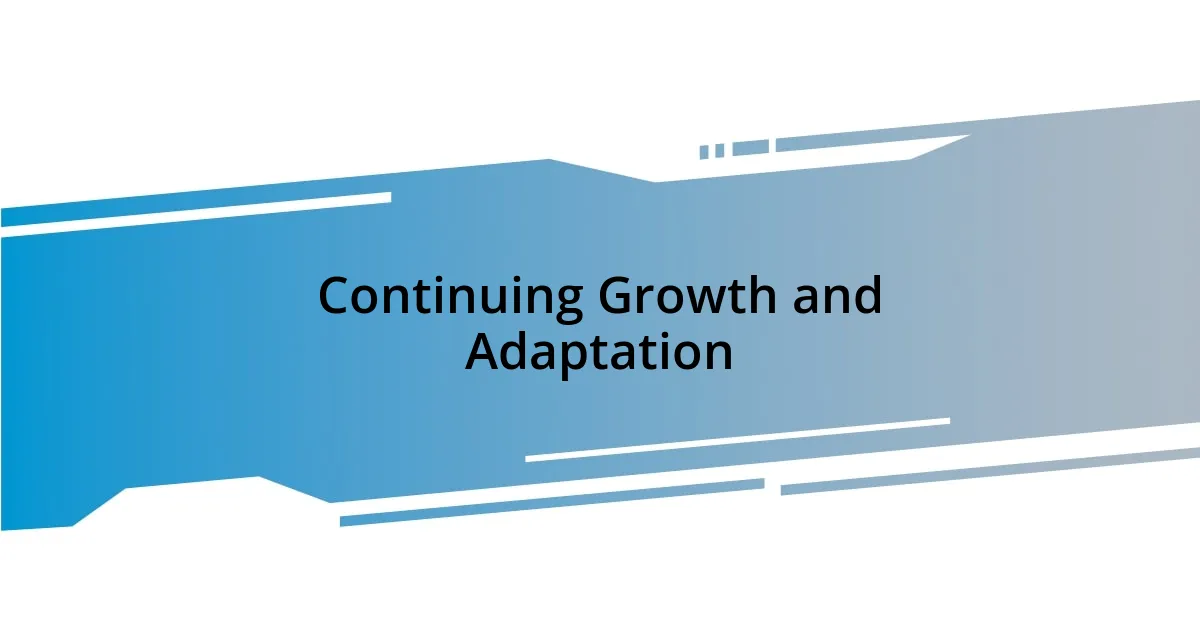
Continuing Growth and Adaptation
Continuing growth and adaptation is a natural part of my writing journey. I remember the first time I attempted to write in a genre I had never explored before. I picked up a romance novel, intrigued by its emotional complexity, and tried my hand at crafting a heartfelt scene. It was challenging, and I stumbled through the process, but those early missteps taught me lessons about vulnerability and connection that I still carry with me. Have you ever pushed yourself out of your comfort zone? Those moments of uncertainty often cultivate the most significant growth.
As I evolve as a writer, I’ve learned that embracing change is just as critical as seeking it. For example, after reading about the importance of digital platforms for writers, I decided to experiment with blogging. Initially, I felt overwhelmed by formatting and audience engagement but quickly discovered a community that welcomed my voice. That shift not only expanded my reach but also strengthened my writing, as I started tailoring my content to resonate with readers. Isn’t it remarkable how adapting to new mediums can rekindle your passion?
I also find it essential to regularly revisit my past work to gauge my growth. One evening, I browsed through old drafts and stumbled upon a poem that I had abandoned years ago. I could see the potential in the lines but hadn’t yet mastered the craft to bring it to life. Revisiting that piece opened my eyes to how far I’ve come and reminded me that every experience is a stepping stone. How often do we reflect on our previous creations to measure our growth? This practice not only nurtures appreciation for my journey but reinforces my resolve to keep evolving.







